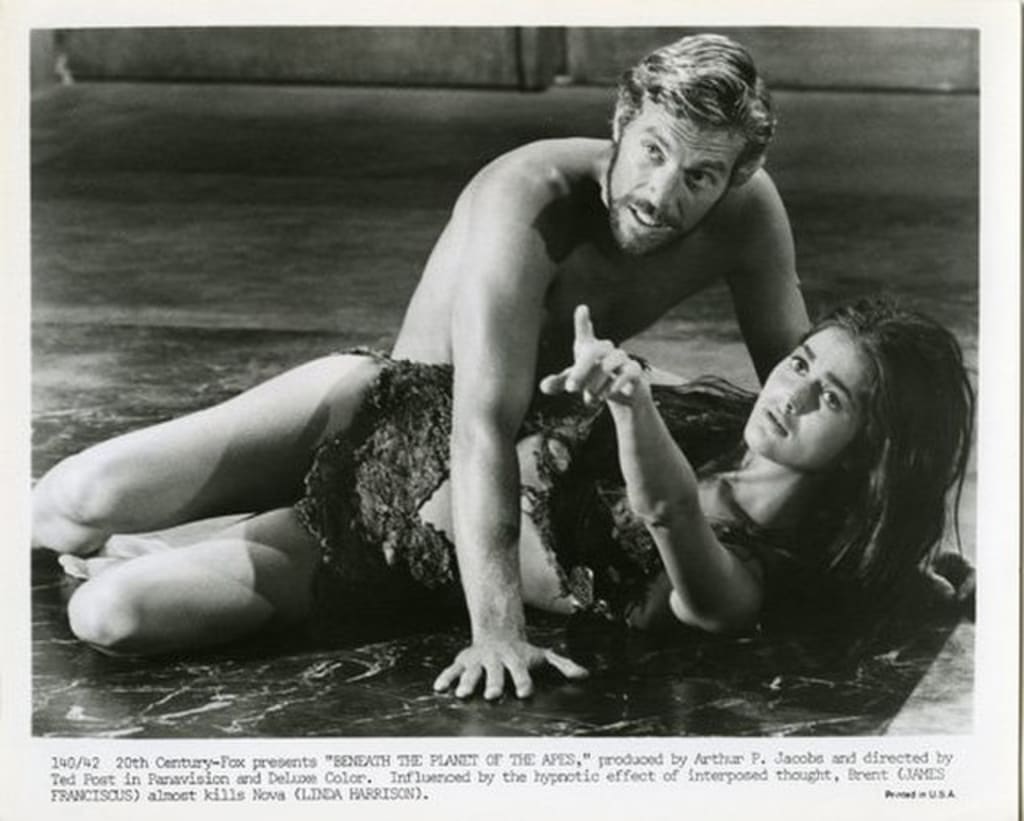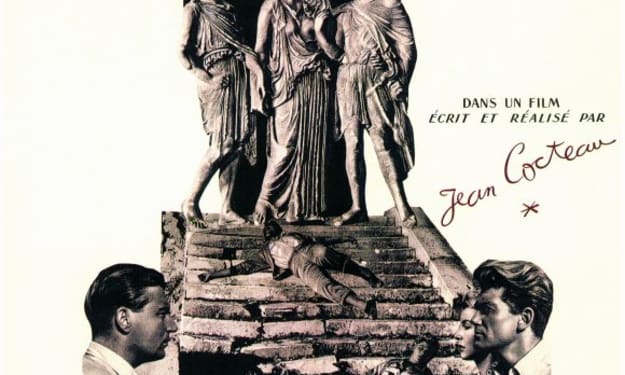
Beneath the Planet of the Apes is an old, old classic--a film that has taken deep cultural roots in the fifty years since its release. It takes up where the original Apes leaves off--with Nova (Linda Harrison) and Taylor (Charlton Heston) riding across the desert of the Forbidden Zone (after Taylor has had his Statue of Liberty-induced meltdown), and suddenly finding Taylor mysteriously disappearing, leaving the mute, confused Nova all alone.
Following in the footsteps of the original astronauts led by Taylor is Brent (James Franciscus), who likewise crash lands on the mysterious Ape Planet, with his copilot dying and leaving him a stranded explorer, alone in inhospitable terrain. He finds Nova, who is wearing dog tags that identify Taylor. Nova leads Franciscus to Cornelius (played in this sequel by David Watson instead of Roddy McDowell) and his headstrong, hyper-intelligent wife Zira (Kim Hunter reprising her role from the original film).
The two have been acquitted from their trial for "heresy" (which they faced at the end of the last film), however ape society is in a militaristic upheaval, with the swaggering, war-mongering General Ursus (James Gregory) planning on leading an expeditionary force into the Forbidden Zone, for, "The only good human, is a dead human!" The more benevolent Dr. Zaius (Maurice Evans) seems unable to dissuade him.
Brent makes is given appropriate human rags to wear, and is told by Cornelius that, if he is captured, he is "not to talk."
Brent replies, "What the hell would I have to say to a gorilla?"
"You don't understand," answers Cornelius. "If you speak, they will dissect you, and kill you, in that order."
Brent and Nova are then taken by the gorillas and earmarked for "target practice," but the sympathetic Zira manages to make it so they can escape from the wagon in which they are held, prisoner. Brent and Nova go into the Forbidden Zone, ahead of the gorilla-lead expedition, and find themselves in the ruins of a subway system and finally, an underground city.
The film takes a turn for the mystical in that, in these ruins, "beneath the planet of the Apes," is a cult of very strange robed individuals who can speak telepathically, and who seem to be able to project their thoughts into hallucinations to use as weapons or even mind control. ("We don't kill our enemies," says one. "We get our enemies to kill each other.")
The apes, led by Ursus and Dr. Zaius, come upon a vision that would have made Vlad the Impaler proud, row after row of apes on stakes, and then a mass fire scorching them in agonizing death. Dr. Zaius says, "Order your men to shoot our poor people!"
To which Ursus replies, "I can't order them to do what the Lawgiver has forbidden!"
Finally, though, they realize the vision is simply that--just a vivid hallucination. They find their way down to the ruins where the mind control cult is living.
Brent and Nova are reunited with Taylor. The film takes a very darkly surrealistic and humorous, satirical bent: it turns out these cultists are BOMB WORSHIPPERS.
In the literal sense, they have a gleaming silver rocket tipped with a thermonuclear warhead in their cavernous temple, and Taylor and Brent are told to don robes while the cult hysterically worships it (dubbed, heavenly choir music adding a tinge of the absurd to the proceedings). Making reference to the "Divine Bomb, " and the "Holy Fallout," they finally strip off their faces (some of the most recognizable actors here are Victor Buono and Robert Vaughn, as well as Natalie Trundy) and reveal why their lips never move and they never change facial expressions: beneath the latex face masks they wear, they are reptile-like, albino mutants. This mutation, as well as their psychic abilities, is the result of long-living below the earth. (Such subterranean mutations are a science fiction concept that has been employed by authors as diverse as Thea von Harbou, Wells, and Edward Bulwer-Lytton.)
Cut to the chase: The apes invade the bomb-worshippers dwelling. A gun battle ensues. Nova, and finally Taylor is killed. At the last moment, Taylor crawled his misanthropic, dying self to the bomb controls, releasing it and causing a "chain reaction" that annihilates the entire planet.
The end of the film is hopelessly nihilistic, grim; almost religious. The bomb itself is marked with the Greek letters "Alpha and Omega"; the "beginning and the end."
Made in 1970, Beneath is a pointed, barbed satire of war-mongering, swaggering religious devotion, the "hidden face" of White, bourgeois society, slavishly bent toward self-destruction, as if worshipping, like unthinking robots, a literal doomsday device.
The Bomb-Worshippers use their hallucinatory powers of mind control to "fool" their enemies (save for the apes, whom they categorize as being too "mentally weak" for even mind control). This metaphor for propaganda, for mass mind-control of whole populations goaded toward subservience and war by the promises of a decayed, bourgeois, capitalist society, hellbent on its obliteration, is a subversive satire pointed at the same government that was pumping the blood and treasure of Young America into the steaming jungles of a fruitless war in Vietnam.
At one point, the swaggering demagogue Ursus proclaims, "I don't hate humans just because their skin is white!" This is an inversion of the racism so inherent in 1970, the Apes movies and their characterization of Ape society held up as a mirror of our vast prejudices, hostility, and aggression; our too-human foibles.
At another point, while the gorillas are going off through Ape City on their ill-conceived military adventure, a group of idealistic chimpanzees (the "intellectual caste" of simian society) comes with a protest chant of "peace and freedom!", and then stages a sit-in. So reminiscent is this of the sit-ins in the name of racial justice and stopping the war in Vietnam that were then occurring, that the true message of the film (beyond it just being Saturday Matinee science fiction pap) is not lost on the viewer.
The film finally is intensely downbeat and disturbing--the subtle satire WILL be lost on the children who watch it, who will respond with happiness instead to the ape-costumed actors. For others, it will be a message in a bottle of sorts, down through the decades, delivered subtly and comically to modern viewers, who will appreciate it and ponder it later, no matter what their perspective.
"Beneath the Planet of the Apes" (1970) Trailer
About the Creator
Tom Baker
Author of Haunted Indianapolis, Indiana Ghost Folklore, Midwest Maniacs, Midwest UFOs and Beyond, Scary Urban Legends, 50 Famous Fables and Folk Tales, and Notorious Crimes of the Upper Midwest.: http://tombakerbooks.weebly.com






Comments
There are no comments for this story
Be the first to respond and start the conversation.